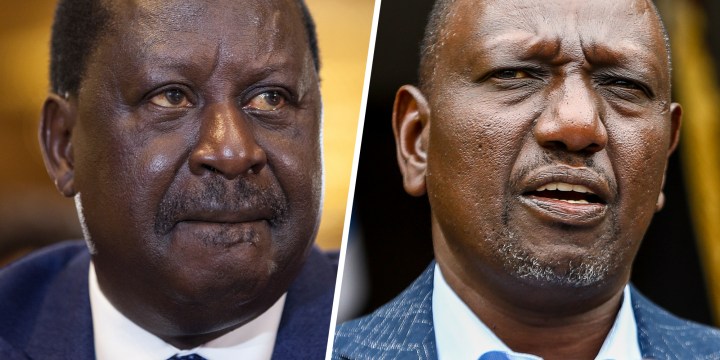ELECTIONS OP-ED
Fifth time lucky? Raila Odinga targets triumph in Kenya presidential elections

Kenyans go to the polls on Tuesday, where veteran opposition politician and serial loser Raila Odinga, 77, faces off against vice president William Ruto, 55.
Kenya, with a gloomy and sordid history of fierce electoral disputes and violence, is scheduled to hold general elections on Tuesday 9 August 2022. In these elections, citizens will elect the president, members of the National Assembly and Senate, county governors as well as members of the 47 county assemblies.
Electoral trajectories of modern Kenyan politics
The build-up to these elections is engulfed by the fall-out of former allies and strongmen in modern Kenyan politics: the incumbent president, Uhuru Kenyatta and his current deputy president, William Ruto. The root cause for their loggerheads is unquestionably submerged by incongruencies of accusations levelled against each other.
More intensely, even though Ruto was Kenyatta’s running mate in the last presidential elections that took place in 2017, Kenyatta is hell-bent on impeding the deputy president from being his successor. A major variable of this twist emanates from Kenyatta’s endorsement of the perennial candidate in the presidential elections who is also a former Kenyan prime minister, Raila Odinga. The latter is a presidential candidate for the Orange Democratic Movement (ODM) under the auspices of the Azimio La Umoja coalition.
Interestingly, during the 2017 presidential elections, Kenyatta joined forces and formed a functional alliance with Ruto. After the electoral management body, Independent Electoral and Boundaries Commission (IEBC), declared the duo as election winners, Odinga lodged an electoral dispute based on rife allegations of vote rigging. Principally, adducing concrete evidence that proved that IEBC’s server was hacked and its database had been tampered with.
Visit Daily Maverick’s home page for more news, analysis and investigations
Eventually, the Supreme Court of Kenya, led by the present-day retired Chief Justice and President, Justice David Maraga, annulled the results of the presidential elections and ordered fresh elections. To ensure free and credible election re-run, Odinga further requested for the overhaul of electoral systems, and his plea was not granted. While protesting the failure to heed his call for reforming electoral systems and the IEBC, and although not official as dictated by Kenyan electoral laws, Odinga withdrew from the runoff election, thus paving the way to the duo’s electoral victory again.
Odinga’s perennial candidacy in presidential elections
Raila Odinga, the son of Oginga Odinga, Kenya’s first vice-president (from 12 December 1964 to 14 April 1966) and subsequently opposition leader, has unsuccessfully contested the presidential election four times in 1997, 2007, 2013 and 2017. Boasted by the support from Kenyatta, Odinga’s fifth contestation in presidential elections may spell a greater chance to lead Kenya at the age of 77 years. Comparatively, Hakainde Hichilema, the current president of Zambia, contested the presidential election five times: 2006, 2008, 2011, 2015 and 2016, before being triumphant in the 2021 presidential election, accumulating over 59% of the vote.
With the considerable support of president Kenyatta, the incoming presidential elections may either deliver Odinga to the State House or indefinitely condemn him into his undesirable perennial candidacy. Possibly, a fifth unsuccessful presidential contestation may compel Odinga to gracefully retire from active politics.
Kenyatta’s choice for Odinga
In the aftermath of unsuccessfully contesting four times in elections, loathness for a fifth attempt to run for the position of Kenya’s presidency overwhelmed Odinga. This reluctance was unveiled by president Kenyatta during a congregation with Luo and Luhya leaders in Nyanza. In fact, Kenyatta induced Odinga by asserting that he was the sole alternative who could emerge victorious against Ruto. The latter is the presidential candidate for the United Democratic Alliance, which is the largest party under the Kenya Kwanza coalition.
Kenyatta points out that he has overlooked other presidential hopefuls such as Musalia Mudavadi, Kalonzo Musyoka, Peter Kenneth, Fred Matiang’i, Justin Muturi and Dr Mukhisa Kituyi. While Odinga’s running mate is Martha Wangari Karua, the Kenya Kwanza Coalition has opted for Rigathi Gachagua as the deputy presidential candidate aligned with Ruto.
The smoothened relations between president Kenyatta and Odinga owe their threshold to the popular ‘handshake’ between the two newly found allies, which occurred on 9 March 2018. The ‘handshake’ is the labelling of the unforeseen political allegiance between them. Within the pair’s lenses, this signalled the end of tension, distrust and hostilities and envisioned a mandatory roadmap for devising common ground for driving forward the economic and political interests of Kenya.
‘Handshaking’ into the succession plan?
In the view of Kenyatta, Kenya’s prospects of eradicating endemic corruption stem from Odinga’s ascension into the presidency. This bold statement may be construed as an implication that Ruto’s leadership could plunge the country into irreversible bad governance. More so, to Kenyatta, since their momentary ‘mandshake’, Odinga had demonstrated goodwill, whilst Ruto has resorted to divisive politicking that negates the country’s progress.
Importantly, having previously vied for the presidency four times, with divisive politics, electoral rigging, and subsequent politically motivated violence, perhaps the endorsement of Odinga may change the political landscape of Kenyan elections. Nevertheless, for president Kenyatta, his succession plan is not merely confined to the quest for national cohesion, but also development.
All factors considered; 25 years since his first presidential contestation in 1997, one may still ponder if Raila Odinga can triumph in his fifth attempt to lead Kenya as president. DM
Paul Mudau is a Senior Lecturer in the Department of Public, Constitutional, and International Law at the University of South Africa.


















 Become an Insider
Become an Insider
Comments - Please login in order to comment.